
|
* Information contained in this news release is current as of its date of announcement. Be aware that information contained herein is subject to change without notice. |
Interim Field Test Results Disclosed for Networked Home-Use Plant Factories in Kashiwanoha Smart City, Chiba Prefecture
Results on Display at the Plant Factory & Smart Agriculture Exhibition (May 29-31, 2013 at Tokyo Big Sight)
May 29, 2013
Chiba University
Mitsui Fudosan Co., Ltd.
Panasonic Corporation
Mirai, Inc.
The Urban Plant Factory Consortium Kashiwanoha Demonstration Committee (hereinafter, “the Consortium”), which comprises Chiba University, Mitsui Fudosan Co., Ltd., Panasonic Corporation and Mirai, Inc. has disclosed interim results of a field test of networked home-use plant factories. This field test has been carried out by five households serving as resident monitors in Kashiwanoha Smart City since September 2012.
In the field trial, the five households serving as resident monitors have been growing and harvesting vegetables on a daily basis using home-use plant factories installed in their homes. Panasonic developed the prototype model of the home-use plant factory, while the Faculty of Engineering of Chiba University came up with the exterior design. The vegetables are grown using home-use cultivation manuals (including seedlings, and information on growing conditions) developed by Mirai, Inc. under the supervision of Chiba University. The field trial is being conducted from September 2012 to August 2013, and will serve as a verification step in the process of commercializing this equipment.
Through the field test, the Consortium is aims to verify the following two key points:
1. Verification of small-scale plant factories use in the home
2. Verification that networking the home-use plant factories create added value
In regard to the first point, the field test is verifying how well vegetables grow using the cultivation manuals provided by Mirai, the operability of the plant factory itself, and how it is used in a real-life setting. Unlike large-scale plant factories, where air-conditioning and other factors can be completely controlled, home-use plant factories experience different temperatures, humidities and other conditions. In this environment, the field test is verifying vegetable harvesting frequency and quality conditions.
In regard to the second point, the field test is verifying the utility and commercial viability of a “food community” formed by encouraging various social interactions among the participants. One example is the exchange of daily vegetable growing information and vegetable-dish recipes through the dedicated website “Mirai Hatake Smart Network,” which links the monitors to each other and to experts (Mirai and Panasonic) over a network. Another example is holding food-tasting events.
Through the above verification, the field study has confirmed the following with respect to home-use plant factories: (1) vegetables can be grown rapidly and can be harvested steadily; (2) the vegetables have high nutritional content; and (3) forming a network helps to motivate people to grow vegetables and promotes community development.
Details of the field trial results, the home-use plant factories and related initiatives will be displayed at the Plant Factory & Smart Agriculture Exhibition at the Smart Community Japan 2013 event to be held at Tokyo Big Sight from May 29-31, 2013. Website URL: http://www.nikkan.co.jp/eve/smart/agri.html (Japanese only)
1.Verification of small-scale plant factory use in the home
Harvesting conditions
- The field test confirmed that the features of small-scale plant factories enable the following
- Vegetables grow rapidly. If grown from seedlings, vegetables can be harvested in about 2-3 weeks. If grown from seeds, vegetables were harvested within a short span of around 1 month.
- There were no major differences in growing conditions among monitors or due to the external environment, such as season, and vegetables can be harvested steadily.
- Guided by expert advice obtained over networks, the monitors attempted to grow many different types of vegetable during the field test period. The field test confirmed that even individuals can grow a wide array of vegetables.
Quality conditions
- A nutritional content analysis performed by a public institution found that the field test vegetables' nutritional content, including minerals, registered values consistent with Japanese dietary standards (FY2010 version).
- The field test confirmed that lettuce grown in the home-use plant factories contained higher beta-carotene content than ordinary lettuce grown outdoors. Beta-carotene is believed to have health and beauty benefits.
2.Verification that networking the home-use plant factories create added value
Interaction among monitors
- The field study's dedicated website received 57 submissions of vegetable-dish recipes. With many monitors also preparing dishes based on other website posts, the field study observed that the website improved the monitors' motivation to grow vegetables.
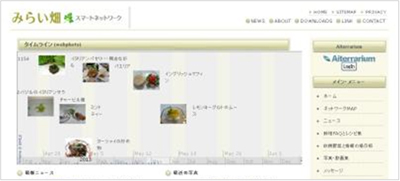
Communication on a dedicated website
- At social gatherings of the monitors, they actively exchanged views on growing tips and changes in their daily lives. Besides vegetable growing, they also presented ways to enjoy their home-use plant factories as a home interior product, with topics including the design qualities of the home-use plant factory itself, and its role in displaying plants.
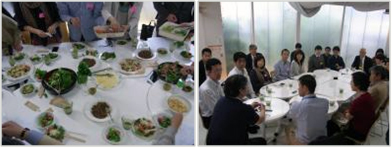
A social gathering of monitors
Comments by monitors
- The vegetables grew very quickly at first, so the plant factory kept me very busy growing vegetables. Once I became familiar with the process, I was able to control the situation on my own, and I started to enjoy growing the vegetables. (Woman in her 30s)
- Besides growing vegetables from the seedlings provided, I wanted to try growing vegetables from seeds, and try growing different kinds of vegetables such as radishes. That's what I find to be enjoyable. (Woman in her 60s)
- I was able to use my plant factory to grow rare vegetables such as chervil and coriander, which are seldom available in stores. This is very helpful because I can now eat these vegetables whenever I want. (Woman in her 40s)
Field Study Considerations
- Chiba University
- The Center for Environment, Health and Field Sciences of Chiba University is conducting research focused on consumers in Kashiwanoha Smart City by returning the benefits of plant factory technology to society, while bringing this technology to fruition in the daily lives of highly aware local people. We have obtained extremely significant results from these field studies. We will continue to conduct our Plant Environment Designing Program, which is aimed at promoting greater use of plant factories in daily life.
- Mitsui Fudosan
- One goal of Kashiwanoha Smart City is to create a fulfilling community based on an ICT platform. We strongly believe that the Mirai Hatake Smart Network has the potential to create new lifestyles and social interaction through agriculture and diet, in addition to ensuring food safety. Accordingly, we will continue to pursue this field test.
- Panasonic
- Through this field trial, we confirmed that we can provide people with the joy of viewing and harvesting plants, as well as the joy of coming together as a community, in addition to growing vegetables in the home. We will continue cooperating on the field trial with the aim of achieving the town development concept of Kashiwanoha Smart City.
- Mirai
- We will continue to develop home-use plant factories and large-scale plant factories in the same region, while helping people grow vegetables in the home by supplying seedlings. We aim to form an extensive network of plant factories in Japan and overseas.
Future Initiatives of the Urban Plant Factory Consortium
The Consortium has been working to create opportunities for people to come into contact with plant factories in the their daily lives, such as by selling vegetables produced by plant factories in supermarkets and supplying salad greens to restaurants within retail facilities. In addition, the Consortium has installed a 6.6 m2 medium-scale “Mirai Hatake” plant factory in LaLaPort KASHIWANOHA, a retail facility close to the train station in Kashiwanoha Smart City. Looking ahead, the Consortium aims to build the “Mirai Hatake Smart Network” by installing plant factories in all manner of locations in town, such as homes, schools, retail facilities and hospitals, while promoting optimal regional use of these plant factories by linking them over a network.
About the Home-use plant factory
Device details
| Device used |
External dimensions
Approx. 60 cm (width) x approx. 38 cm (depth) x approx. 85 cm (height)
Light source
LED lighting (red and white, includes blue light components)
* With automatic on/off switch functionality
Number of plants cultivatable
Five to seven plants at a time
|
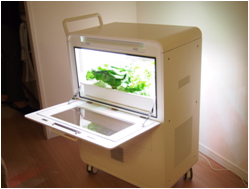 |
| Produce cultivated |
Total of 30 types (monitors are free to choose the types of vegetable they wish to grow)
Vegetables
Lettuce, romaine lettuce, green leaf lettuce, Korean lettuce, potherb mustard, karashi mizuna, Japanese chervil, green onion, garland chrysanthemum, perilla, bok choy, leaf celery, endive, water spinach, Japanese mustard spinach, turnip
Herbs
Rucola, basil, mint, watercress, mustard greens, sage, lemon balm, marjoram, dill, chervil, hyssop, Italian parsley, parsley, coriander
|
About the dedicated website “Mirai Hatake Smart Network”
What is the “Mirai Hatake Smart Network”?
“Mirai Hatake Smart Network” collectively refers to a system for optimizing the use of vegetables throughout the region by centrally managing plant factories installed in the Kashiwanoha Campus area. Currently, Chiba University is developing a large-scale plant factory site, and operates a 6.6 m2 medium-scale plant factory in LaLaPort KASHIWANOHA, a retail facility close to a train station. In the field test of home-use plant factories, a dedicated website, “Mirai Hatake Smart Network,” was launched to link the home-use plant factories, and demonstration trials are under way to build the network.
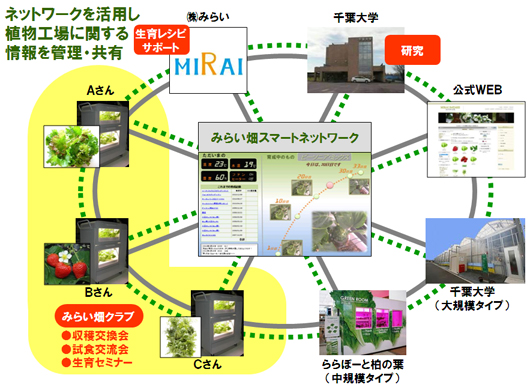
Image of Mirai Hatake Smart Network
Main Website Content
- Functions Supporting Interaction among Resident Monitors
By visualizing (sharing) information on how each monitor is growing vegetables over a network, the website allows monitors to easily obtain information on growing the vegetables to be harvested, and to exchange information on recipes. The website also promotes interaction by enabling monitors to submit questions to experts and receive their advice.
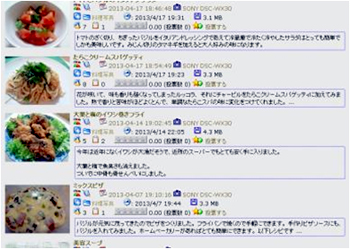
Recipes are exchanged using functions for supporting interaction
- 24-hour vegetable recording and confirmation function using cameras
The home-use plant factories are fitted with a camera that records the vegetables 24 hours a day. Monitors can confirm the cultivation status of vegetables and share a log of vegetable growth using PCs or smartphones via the website.
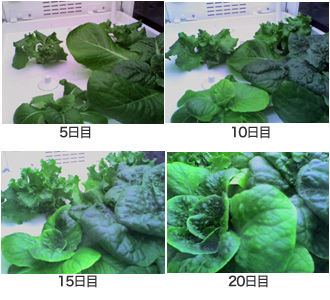
Photos taken using the camera
|
|
|